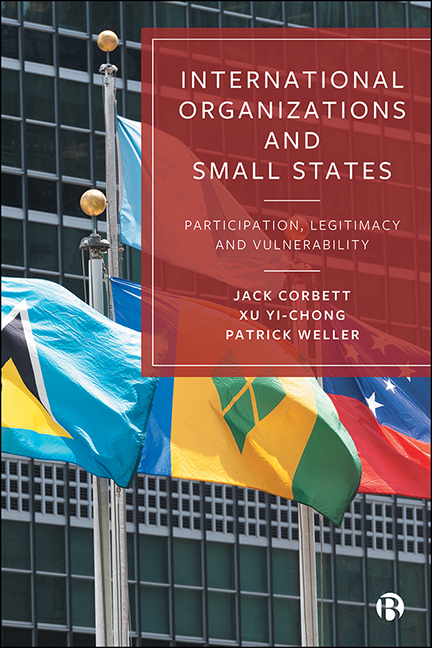4 - Differentiated Vulnerabilities, Climate Change, and the UN Agencies
Published online by Cambridge University Press: 13 May 2022
Summary
Climate change is the policy issue most commonly associated with the influence of small states and SIDS in particular. It is therefore a ‘most likely’ case (Eckstein, 1975) for their influence. Climate change magnifies the common dilemma for small states – that they have to fulfil the minimum requirements of modern statehood with limited resources or capacity. It also represents a significant challenge to the legitimacy of IOs because the smallest members will bear the disproportionate impact while the largest and richest are responsible for the vast majority of emissions. The impact of climate change on SIDS thus infringes on two key norms of the LIO – the sovereign equality of states and the right to development.
The consequence is that the creation of the SIDS category and the prominence provided to SIDS in climate change negotiations and policy suits both small states and IOs: it allows the countries we call SIDS to ‘perform vulnerability’ while also enabling IOs to generate ‘throughput’ legitimacy. But to understand this we have to recognize that the category SIDS is not a neutral or technical label. It is a political tool designed to realize specific ends. The creation of the label SIDS, the associated groupings at different IOs, and the fact that actors talk about a ‘SIDS agenda’, is the most compelling evidence we have for the way these states have altered the practices of IOs.
This chapter tells this story from both sides. We start with small states and show how they have pressured IOs to recognize their unique vulnerabilities. We then tell the story of IOs and how they have responded to these concerns. Small states, acting as a group, have been central to each of the major climate summits since Rio. They are key negotiators at COP. They were integral to the formation of the High Ambition Coalition (HAC) in the lead up to the Paris COP and thus played a central role in the subsequent agreements. This story is well documented so we pay particular attention to the IMO and the way SIDS have recently positioned themselves to achieve greenhouse gas (GHG) reductions.
- Type
- Chapter
- Information
- International Organizations and Small StatesParticipation, Legitimacy and Vulnerability, pp. 87 - 110Publisher: Bristol University PressPrint publication year: 2021

